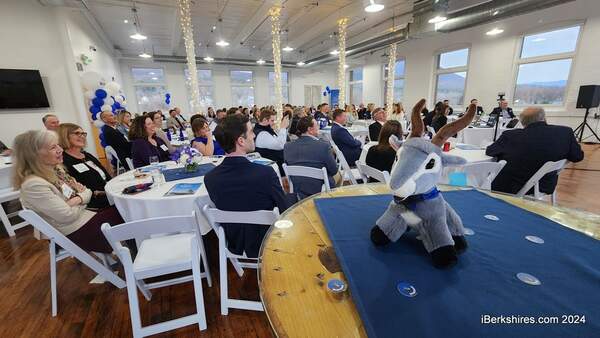Town of Florida Seeking Better Internet Service; WiredWest Leading the Charge
 Forty-seven towns in Western Massachusetts have decided to join discussions with WiredWest. The town of Cummington was scheduled to vote on its participation during town meeting on Thursday night. |
Voters passed an article during last Friday's town meeting to enter into discussions with WiredWest, a project working to create a municipally-owned, open-access, fiber-to-the-home network to Western Massachusetts communities. As of Thursday afternoon, 47 towns were on board to participate.
The purpose of WiredWest is to unite the unserved or underserved towns and to provide every resident with affordable access to the Internet. According to Monica Webb, spokeswoman for WiredWest and a member of its Steering Committee, fiber-optic is the wave of the future when it comes to transmitting information over long distances and amidst high traffic.
"We can split one fiber-optic cable, which is the size of a human piece of hair, up to 1,000 spectrums," she said.
Given the rapidly increasing use of bandwidth in the United States — Webb says it grows about 50 percent a year — digital and satellite lines are slowing. In rural towns like Florida, gaining access to the Internet has become a struggle for many residents.
There have been multiple efforts in the last several years to upgrade service in Florida. A pilot program was launched, but fell flat on a townwide level because the signal reached only the residents meeting the "line-of-sight" requirements. Soon after, Verizon Wireless established its services in Florida, but there are areas of town that cannot receive a strong signal.
Jana Hunkler Brule, a member of Florida's Broadband Committee, cannot receive a DSL signal from where she lives in town. She opted for the satellite package, which she says isn't reliable because the service is spotty and it limits the amount of bandwidth that can be transmitted per month.
Webb said the "the best of the old technologies" are not meeting the growing demands of online users. For example, she said the bandwidth streamed when viewing one high-definition video on YouTube is the equivalent of visiting 35,000 Web pages.
"It's as if you have a water pipe to serve the community, and it's designed for the amount of traffic there was five years ago," she said. "The water usage increases 50 percent every year, so how much longer does it take to fill your sink?"
Brule and Kathy Keeser, members of Florida's Broadband Committee, will represent their town this Saturday at WiredWest's kick-off meeting. The assembly will take place at Cummington's Community House.
Brule said she doesn't know quite what to expect from the session, but she hopes to learn more about the projected costs.
"I think people will be behind this unless its horrendously expensive," she said. "All residents in every town should have access to the Internet. It should have nothing to do with what terrain you live on or how far off the road you live."
WiredWest has hired Andrew Cohill, a communications broadband specialist, as a consultant to the project. Webb hopes to begin crafting a business model, with help from town representatives, and there will be an effort to obtain monetary support from the federal government's infrastructure stimulus fund.
Webb moved to Monterey, a rural town located in Southern Berkshire County, several years ago with her husband. She said that gaining access to the Internet was "excruciatingly frustrating."
Her frustration is shared by many, not just in Western Mass., but across the United States. Fiber-optic, municipally owned networks have already been established in Washington state, Ohio and Indiana. Webb said there are proposals in New Hampshire and Vermont.
Webb said the private sector has no financial incentive to establish fiber-optic networks in rural communities. WiredWest plans to shift ownership of the information highway back to consumers, which will prevent service providers from hiking up prices and defining who gets access to the Internet.
"It's like the highway is being upgraded," Webb said. "Providers will still be able to offer their services, but it will be the consumers, especially, who will benefit."
For more information on WiredWest, visit their Web site.















